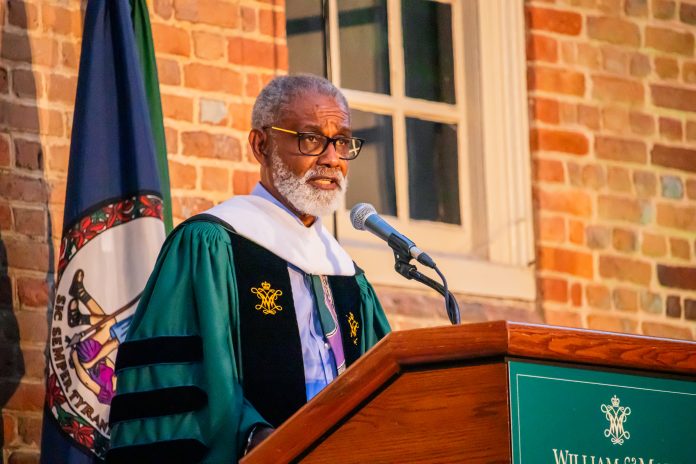Wednesday, Aug. 28, the College of William and Mary marked the beginning of a new academic year during its Opening Convocation ceremony, with Dr. Cleveland “Cleve” Francis Jr. M.A. ’69 serving as the keynote speaker.
Following the reading of the land acknowledgement by Dakota C. Kinsel ’26, president of the American Indian Student Association, College President Katherine Rowe gave her opening remarks.
Rowe touched on the topic of civil disagreement, citing a quote from the philosopher Hannah Arendt to “think what we are doing.”
“At William and Mary, we do not dox each other,” Rowe said. “At William and Mary, we do not cancel each other. At William and Mary, we think for ourselves, and we take incredibly seriously the charge to be curious and come to our own conclusions based on evidence. William and Mary students do not like to be told what to think, and that is something that we honor and are deeply proud of. We know that if something on social media sounds incredibly improbable, it’s probably not true.”
College Provost Peggy Agouris also gave remarks. She cited Aristotle and encouraged students to get involved in democracy, particularly through voting and other efforts.
“So get involved, share in the utmost, see what sparks your interest, and don’t be afraid to encounter new experiences,” Agouris said. “There’s a wealth of knowledge and collaboration here that you are now a part of. Share in the utmost because our ability to affect change begins on campus.”
Following Agouris’s remarks, Francis took the stage to recount his cherished time at the College. In reference to the College’s Year of the Arts, he evoked the ‘symphony’ of experiences he had as a graduate student studying biology while also pursuing his passion for music. Francis shared how the combination of these interests allowed him to succeed at the College, and how incoming students can do the same.
“Through science and music, I found my place and my voice in this community,” Francis said. “For me, finding my place was no small thing. I had come from Southern University, the historically Black institution in Baton Rouge, Louisiana. At Southern, 10,000 on campus looked like me. But at William & Mary in 1967, I was one of only seven Black students on campus.”
Francis emphasized that the College fosters belonging for all students who enroll.
“Maybe some of you today have some of the same worries as I did back then,” he added. “You might wonder about whether you belong here and how you will perform as a student next to all these other very smart people. Don’t worry. Here at William and Mary, you will have every opportunity to thrive.”
Francis mentioned the support he received from the surrounding Williamsburg community, notably the First Baptist Church, where his musicality was celebrated and honed alongside then-Pastor, Reverend David Collins.
“When I had boarded the train in New Orleans, my mother called out a last word of advice: ‘You’ll be fine, you just find the church,’” Francis said. “She knew the Black church to be a vibrant support network like no other, surpassing the Masons, the Toastmasters and any fraternity or sorority in the known world.”
Francis then described a historical account of the College. He paid homage to the enslaved people who constructed the institution, celebrating the 2022 installation of the Hearth: Memorial to the Enslaved on campus.
“The White Lion traveled up the James River carrying African men, women and children who had been kidnapped from their villages, torn from their homelands and sold into slavery,” Francis said. “I could see the ghosts of my ancestors and their descendants as they labored on Virginia plantations for over three hundred years. We now have a memorial at William and Mary, called the Hearth, to commemorate the enslaved Africans who helped build and cared for this institution of higher learning.”
Francis concluded his remarks by reminding students of the College’s promise in shaping the greater American story, and the contributions each of them can make.
“The saga of America is still being written,” Francis said. “Consider how you can add to that story and improve the lives of those who will follow.”
As part of the ceremony, Rowe also recognized two recipients of the President’s Award for Service to the Community: Michelle Indelicato ’25 and professor Debbie Ramer, who is a clinical faculty member in special education and director of the special education program at the College’s School of Education.
Indelicato, among other roles, is a team leader at Williamsburg Engagement Program, a virtual researcher for the Food Empowerment Project and a volunteer at the Animal Welfare League of Alexandria. On the other hand, Ramer is a co-director of the Literacy Lab, an initiative that offers reading and tutoring services to local elementary school students.
Class of 2025 President Matthew Hwang ’25 also presented the Class of 2028 banner to Rowe, who accepted it on behalf of the freshman class. Thereafter, the freshman class undertook the tradition of walking through the Wren Building.
“The energy was really high walking out of the Wren Building,” Owen Cheek ’28 said. “There were a bunch of people screaming at you, a bunch of high fives. It was all really positive and was a good welcome to William and Mary.”

